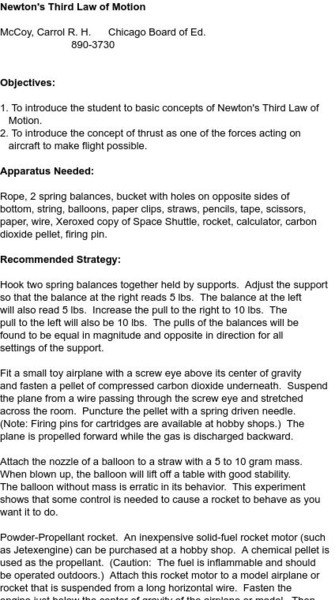Other
See How It Flies: Airfoils and Airflow
One chapter from a larger site dedicated to explaining the physics of flight. Numerous diagrams show the flow of air around an airfoil.
University of Minnesota
The Physics of Flight: Bernoulli's Principle
Discusses air flow around the wing of a plane and its effect upon the lift and drag forces. Focuses on the application of Bernoulli's principle to wing design and the subsequent airfoil shapes.
Science Museum, London
Making the Modern World: What Is Stress?
This website gives an overview of stress, its causes, and the physical and psychological results. Case studies and a glossary are included.
NASA
Nasa: Shuttle Reference
This site from NASA goes into great detail about the physical makeup of the Space Shuttle, and includes sidebars with further information about NASA and the manned space program.
Other
Warbirds Resource Group: Luftwaffe Resource Center
This comprehensive site catalogs the planes of the Luftwaffe from 1935 on, and provides detailed specifications on armaments, missiles, bombs and other accessories to air warfare. It does not present a history of their use, but rather a...
Science and Mathematics Initiative for Learning Enhancement (SMILE)
Smile: Lab Activity: Aviation
This site from the Illinois Institute of Technology provides a student lab activity in which the flight of a paper airplane is investigated and studied. Designed for primary grades, but easily adaptable for junior high students.
MadSci Network
Mad Scientist Network: How Do Planes Fly Upside Down?
Question and answer regarding the physics principles that apply to a plane flying upside down.
CK-12 Foundation
Ck 12 Exploration Series: Simulations: What Makes an Airplane Stall?
[Free Registration/Login Required] Learn about the science behind flying an airplane and play this simulation game to see the effects of wing profile, thrust, angle of attack, and airplane size.
NASA
Nasa: Beginner's Guide to Aerodynamics
Includes exhaustive information and a wealth of activities pertaining to aerodynamics and the physics of flight.
Exploratorium
Exploratorium: Hoopster
Students create their own airplane using straws and other materials and learn the principles of aerodynamics.
PBS
Pbs the Life of Birds: Bills, Beaks and Food
This lesson plan explores how natural selection has influenced the development of features that contribute to successful feeding (bills, wings, talons, etc.), as well as identifying those characteristics that enable birds to obtain the...
Other
Planet Ark: Cheap Air Travel Adding to Global Warming
Interesting presentation of information to suggest that cheap airline prices are causing more people to fly, resulting in more jet fuel burning which pollutes the environment. Use this site to obtain a new perspective on the effects of...
Science and Mathematics Initiative for Learning Enhancement (SMILE)
Smile: Lab Work: Come Fly With Me
This site by the Illinois Institute of Technology lets students use a vacuum cleaner hose, ping pong balls, straws and other materials to investigate the effect of moving air upon the surfaces which it hits. Principles are applied as...
Exploratorium
Exploratorium: Science Snacks: Balancing Ball: Suspend a Ball in a Stream of Air
In this lesson plan students learn about air flow using a suspended ball in an air stream.
Curated OER
Science Kids: Science Images: Forces of Lift
This diagram shows the forces of lift that affect the wing of an aircraft. Lift, thrust, weight and drag all affect the flight of the aircraft as well as the angle of attack.
Science and Mathematics Initiative for Learning Enhancement (SMILE)
Smile: Third Law of Motion
This Illinois Institute of Technology site is a lesson plan and lab that utilizes a toy rocket to investigate Newton's third law. Includes directions and practical applications.
PBS
Pbs: Nova: Top Gun Over Moscow
An online exhibit investigating the sensations experienced by a cockpit pilot in a Russian aircraft. Focuses on G-forces and apparent weightlessness.
Canadian Wildlife Federation
Hinterland Who's Who: Bats
Get the facts about bats. Canada is home to nineteen different species of bats. Besides finding detailed physical descriptions of several of these, you'll also learn about some of their unique facts and characteristics. Also included in...
Canadian Wildlife Federation
Hinterland Who's Who: Canvasback
Get the facts about the Canvasback, a wild duck who only lives in North America. Besides finding a detailed physical description of one of the fastest flying ducks, you?ll also learn about some of this bird?s unique facts and...
Canadian Museum of Nature
Canadian Museum of Nature: How Do Birds Fly?
Have you ever wondered about how birds are able to fly? View three 3D animations to see a bird take off, flap in flight and glide. This is an excellent resource to develop an understanding of the physical forces that make this one of the...
Curated OER
Nocirculation
One chapter from a larger site dedicated to explaining the physics of flight. Numerous diagrams show the flow of air around an airfoil.
Curated OER
Circulation
One chapter from a larger site dedicated to explaining the physics of flight. Numerous diagrams show the flow of air around an airfoil.
NASA
Nasa: Rockets Educator Guide: Water Rocket Launcher
Follow the directions in the lesson plan to construct a water rocket launcher made from off the shelf hardware and wood.
Animal Fact Guide
Animal Fact Guide: California Condor
This reference material explores the largest flying bird in California, the condor. Learn about its habitat, diet, physical characteristics, and much more!


















